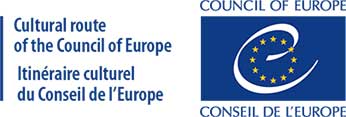
Certified "Cultural Routes of the Council of Europe" regular 3-year evaluation
Every three years, certified Cultural Routes are required to submit a report enabling the Governing Board of the EPA to evaluate their activities in order to ascertain whether they continue to satisfy with the list of eligibility criteria for themes, list of priority fields of action, list of criteria for networks as well as visilibity criteria.
Specifically, the evaluation is meant to ascertain the compliance with Parts I, II, III and IV.2 of the Committee of Ministers Resolution CM/Res(2013)67 revising the rules for the award of the Cultural Route of the Council of Europe certification.
Two main bodies are involved in the regular 3-year evaluation process:
- The Enlarged Partial Agreement on Cultural Routes of the Council of Europe (EPA) is supported by member States, mainly represented by Ministries of Culture, Tourism and Foreign Affairs. The EPA takes the final decision on the renewal of the certification every year during its April's meeting.
- The European Institute of Cultural Routes (EICR), the technical agency set up as part of a political agreement between the Council of Europe and the Grand-Duchy of Luxembourg, supports the EPA's evaluation process. EICR carries out the first assessment of the application and the follow-up of the independent experts' reports.
Regular 3-Year Evaluation of certified “Cultural Routes of the Council of Europe”
An evaluation cycle last approximately 10 months, from the sending of the notification letter by the EPA Secretariat (June - Year 0) to the notification regarding the decision on the renewal of the certification's award (May - Year +1).
End March (Year 0)
- Notification letter sent by the Executive Secretary of the EPA on Cultural Routes of the Council of Europe to the Cultural Routes of the Council of Europe under regular evaluation launching the evaluation cycle.
31st July (Year 0)
- Deadline for submitting the complete evaluation form via the Council of Europe website and by post to the EPA on Cultural Routes of the Council of Europe at its headquarters at the European Institute of Cultural Routes.
October (Year 0)
- Analysis of the documentation submitted by the European Institute of Cultural Routes (EICR).
- Selection by the EPA Secretariat of the independent experts in charge of drafting the evaluation reports.
October – December (Year 0)
- Independent expert review and contact with Cultural Route management in order to verify the documentation submitted and prepare the evaluation report.
- Field visit along the route by the independent expert and meeting with the Cultural Route management.
- Preparation of evaluation report by the independent expert.
End of December (Year 0)
- Deadline for submission of the evaluation reports by the independent experts.
January (Year +1)
- Examination of the evaluation report by the EPA Secretariat with the support of the EICR and drafting of recommendations to the Bureau of the EPA Governing Board.
February (Year +1)
- Examination of the evaluation report by the Bureau of the EPA Governing Board, experts audition where necessary and drafting of recommendations to the EPA Governing Board.
March (Year +1)
- Sending of expert reports to certified Cultural Routes under regular evaluation along with any requests for further information from the EPA Bureau.
- Invitation to present the Cultural Route during the EPA Governing Board April meeting in Luxembourg.
April (Year +1)
- Examination by the EPA Governing Board of the evaluation reports and the recommendations made by the EICR and EPA Bureau.
- Audition of the Cultural Routes under evaluation at the EPA Governing Board meeting in Luxembourg.
- Decision by the EPA Governing Board concerning the renewal of the certification.
May (Year +1)
- Notification letter by the EPA Executive Secretary to the audioned Cultural Routes concerning the results of the evaluation for the renewal of the certification as “Cultural Route of the Council of Europe”.
 Exceptional Evaluation of networks responsible for projects having received the "Council of Europe Cultural Route" certification
Exceptional Evaluation of networks responsible for projects having received the "Council of Europe Cultural Route" certification
Following the meeting of the EPA Governing Board, the Executive Secretary of the EPA informs in writing Cultural Routes undergoing evaluation of the decision of the Governing Board. Cultural Routes whose performance has been found unsatisfactory are requested to submit a new report by 31 December of the calendar year (Evaluation Cycle Year +1) on their organisation, functioning and activities in compliance with the requirements of the Committee of Ministers Resolution CM/Res(2013)67.
An independent expert will be appointed for a desk review of the submitted documentation and a field visit along the route. The independent expert is in charge of the preparation of an evaluation report on the compliance of the Route with the certification criteria.
Following the second evaluation report, if the EPA Governing Board finds the performance of the network unsatisfactory, it may decide to withdraw the certification. In case the representative of the relevant intergovernmental committee is of the opinion that the certification should not be withdrawn, a report will be submitted to the Committee of Ministers of the Council of Europe which will take the final decision on the withdrawal of the "Cultural Route of the Council of Europe" certification.



